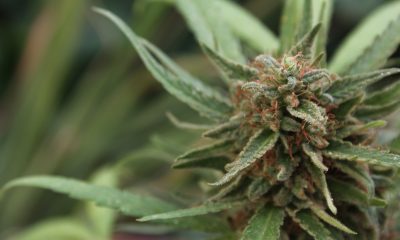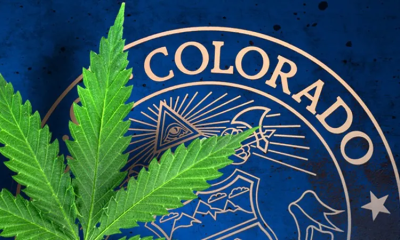International
USA: Senators propose ending federal cannabis ban. Read the details of the CAOA debate here
Published
2 years agoem

On July 21, several US senators presented a bill to legalize cannabis at the federal level. The goal is to end the ban that still exists in the country (despite the many states where cannabis is already legal) and eliminate the criminal records of thousands of US citizens who are serving sentences related to cannabis possession.
O Cannabis Administration & Opportunity Act (CAOA), which in Portuguese translates as the Cannabis Administration and Opportunity Act, further defines a framework for establishing a federal cannabis tax and creating FDA regulations (Food and Drug Administration, similar to Infarmed in Portugal) for cannabis products.
The draft CAOA began to circulate more than a year ago. After 1.800 comments from lawmakers, the national legalization bill grew from the original 163 pages to 296 pages in the final version recently released.
"For far too long, federal cannabis prohibition and the war on drugs has been a war on people and particularly people of color," Senate Majority Leader Chuck Schumer said in a press release after the presentation of the bill. CAOA will be “a catalyst for change by removing cannabis from the federal controlled substance list, protecting public health and safety, and eliminating the criminal records of people with low-level cannabis offenses, giving millions a new opportunity to life".
What's in the new federal legalization bill
The CAOA is very similar to the MORE Act, another bill that was passed by the House of Representatives, but not the Senate, in April of this year. Both MORE and CAOA would remove cannabis from the list of controlled substances and allow the US government to begin taxing cannabis sales. However, one of the big differences between the two is that the latest CAOA includes tax rates and plans for the distribution of tax revenues at the federal level.
Last year, Senator Booker said that the CAOA's holistic approach to legalization would take precedence over more limited specific efforts, such as the SAFE Banking Act, another US cannabis-related bill, which aims to stop banks from penalizing and /or not provide banking services to legal businesses connected with the cannabis industry. Booker has vowed in the past to block the advance of SAFE, mainly because it lacks social equity and criminal justice reform measures.
The entire CAOA bill document can be read HERE (only in English). Key findings from the nearly 300-page proposal include the following:
-
- The Department of Alcohol, Tobacco, Firearms and Explosives (ATF), the Food and Drug Administration (FDA), and the Department of Alcohol and Tobacco Tax and Trade (TTB) would collaborate to regulate different aspects of the cannabis industry.
- The CAOA would protect the rights of workers in the cannabis industry, supported by the potential loss of exploitation licenses to companies that do not comply with labor laws (Sec. 606).
- CAOA would allow banking access to cannabis companies (Sec. 706).
- The law requires re-sentence and filing of some cannabis-related cases (Sec. 311).
- The law places a 5% federal tax on small and medium producers, gradually increasing to 12,5% after five years. For large companies, the federal tax rate would start at 10% and the maximum rate would be 25% (Sec. 5901).
- Some taxes would go to subsidy programs that fund nonprofit organizations specializing in job training, reintegration into society after incarceration, and securing legal aid.
- Equitable Licensing Programs would be available to states and local communities that want to encourage minority and low-income people to participate in the sector.
- CAOA would launch a 10-year pilot program through the Small Business Administration to secure “intermediate loans” to “direct loans to eligible intermediaries who, in turn, make small business loans to start-ups, businesses owned by individuals adversely affected by the war on drugs, and socially and economically disadvantaged small businesses”.
- Federal employers could no longer test employees for cannabis, with some exceptions for jobs such as law enforcement and national security agencies.
- The law would establish a federal standard for impaired driving (Sec. 222). The Department of Transportation will need to develop regulations to identify THC driving within three years after the law is enacted. The National Highway Safety Administration (NHTSA) would collect data on compromised driving to educate citizens and law enforcement at the state level.
- 21 years or older would become the minimum age to buy cannabis nationally (Sec. 1105).
- The CAOA defines sanctions for the cultivation, manufacture, shipment, transportation, receipt, possession, sale, distribution, or purchase of 4,5 kg or more of cannabis without state or federal authorization (Sec. 511).
- The law establishes a new federal definition of hemp, increasing the allowable amount of THC to 0,7% of a plant's dry weight, more than double the current limit of 0,3% (Sec. 803).
- The CAOA would remove cannabis from the Controlled Substances Act within 180 days of its enactment.
- CAOA proposes to ban all vaping products with added natural or artificial flavors.
- The FDA would expand to include a Cannabis Products Center, which would regulate “the production, labeling, distribution, sales and other manufacturing and retailing elements of the cannabis industry,” according to a summary of the CAOA Act.
- States could ban the production and sale of cannabis, but could not prevent cannabis products from being transported between states where cannabis is legal if the products must be transported through a state where cannabis remains illegal.
- The Department of Justice would offer subsidies that would go towards hiring law enforcement officers, carrying out outreach efforts and trying to combat the illicit market.
- Access to federal benefits will be protected for those with cannabis convictions, including federal employees.
- Veterans would have greater access to medical cannabis through doctors at the US Department of Veterans Affairs (VA).
- All retailers would have a federal limit of 10 ounces (about 284gr) per individual retail transaction.
- The Government Accountability Office (GAO) would facilitate studies on cannabis safety and compliance policy.
- The US Department of Health and Human Services (HHS) and the National Institutes of Health (NIH) would investigate the various effects of cannabis products.
- The law would increase the supply of cannabis available for conducting scientific studies and research.
- CAOA funds public education that dissuades youth from using cannabis, plus state funding to prevent youth from using and driving while disabled.
- CAOA funds public education that dissuades youth from using cannabis, plus state funding to prevent youthful use and impaired driving.
Senators discuss cannabis reform at a historic hearing, after the presentation of the bill for legalization
Last Tuesday, senators met at an important Judiciary Subcommittee to discuss cannabis reform, an unprecedented meeting in the US Senate. Members addressed a wide range of cannabis-related issues as Congress continues to explore legislative options to end the ban.
Five people were called to speak, including former cannabis-related inmate Weldon Angelos and cannabis alarmist Alex Berenson, to testify before the subcommittee, which was chaired by Senator Cory Booker.
With the presence of both the five witnesses and the subcommittee members themselves, a wide range of perspectives on the topic were represented, which gave rise to a wide range of conversations, where issues such as racial disparities in the application of cannabis law, the consequences long-term side effects of cannabis convictions, law enforcement considerations, and the therapeutic potential of cannabis, among others.
Of course, the new cannabis legalization bill introduced by Booker, Senate Majority Leader Chuck Schumer and Senate Finance Committee Chair Ron Wyden was also a centerpiece of the hearing.
The Senate Judicial Subcommittee on Crime and Terrorism published, for the first time, an announcement of Tuesday's hearing over the past week, just days before the three Senators released the long-awaited Cannabis Administration and Opportunity Act (CAOA). .
Senator Dick Durbin, chairman of the Judiciary Committee, also spoke at Tuesday's hearing, stating that "it is evident that, like much of the failed war on drugs, the criminal approach to cannabis regulation has resulted in grave injustice." He also stressed that lawmakers must ensure that any legislative reform that moves forward must include clear components to prevent underage use.
Weldon Angelos, who presented his testimony to the Marijuana Moment and who was published in the form of op ed on Monday, described his experience of being held for a federal cannabis conviction, serving 13 years in prison before being released in 2016, and receiving a full presidential pardon four years later. He told senators that there is an immediate need for action by Congress to correct the errors in the ban.
Durbin applauded Angelos, saying he was not a "witness" but a "legend" whose story helped shape Congress' understanding of flaws in the criminal sentencing system. Senator Mike Lee (R-UT) has repeatedly discussed the Angelos case with colleagues to “remind us that what appears to be a significant sentence can get completely out of hand,” Durbin said.
The voices against
But while the gist of Angelos' testimony spoke clearly to the topic of the hearing at hand, supporters are frustrated with the Republican minority's decision to select Berenson as a witness, given his history of playing the role of narcotics and inciting controversy. with questionable claims about issues such as cannabis. Berenson, the author of a 2019 book that attempts to link cannabis use to psychosis and violent crime, gave little indication before the hearing that he intended to temper his demagoguery before the panel.
The potheads – I'm sorry, I mean careful users of an unfairly maligned if not actually miraculous drug! – have just heard I'll be speaking about cannabis and psychosis before Congress. And they are sad.
Sad potheads are the saddest.
Lucky they can just spark up more “medicine.” https://t.co/UxJ6O75WEX
- Alex Berenson (@AlexBerenson) July 25, 2022
The author said that cannabis use is associated with an increased risk of developing serious mental illness, and thus "the legalization or promotion of any drug that could increase the risk of schizophrenia is fraught with risks." He stated that “the cannabis industry and legalization advocates have done everything possible to minimize the link between cannabis and mental illness and to criticize or ridicule those who bring it to light.”
Cotton, the subcommittee member, argued in his opening remarks that cannabis remains federally illegal because it "has no accepted medical use" and "is dangerous and addictive." The senator claimed that Booker's CAOA bill "would be a huge gift to the cartels and gangs and in the midst of a nationwide violent crime wave," in part due to fairness provisions such as acquittals for previous convictions, non-violent, for cannabis.
He also approached Berenson and asked why he felt his cannabis book was poorly received by the industry, to which the witness replied that “people have campaigned to legalize it for a long time” and “the industry seems to see itself as this external counter-cultural force and reacts extremely strongly when you try to discuss the real drawbacks of this”.
Other witnesses included Malik Burnett, a pro-legalization physician who previously worked for the Drug Policy Alliance (DPA), and Steve Cook, a former US Attorney with a reputation as a drug warrior. Also testified to Edward Jackson, who serves as chief of police at the Annapolis Police Department and is a member of the pro-reform group “Law Enforcement Action Partnership (LEAP)”.
Burnett noted that three years ago he testified before House legislators on cannabis reform issues — but little has changed since then, recommending strengthening certain provisions of the CAOA, including through creating financial incentives for police to deprive law enforcement. of cannabis in states where it continues to be criminalized.
Senator Amy Klobuchar (D-MN) also asked witnesses questions about how our scientific understanding of the medical potential of cannabis has evolved since it was banned at the federal level decades ago, racial disparities in cannabis use, and the need to breaking barriers of medical cannabis for military veterans.
Just before the hearing closed, Booker asked Burnett if he had any "concerns" about the "economics of legalization," particularly with regard to small businesses and minority participation in the industry. He also mentioned the potential equity limitations of reform proposals, such as the bipartisan Safe and Fairly Enforced Banking Act (SAFE).
Burnett said he has "significant concerns" and that it is "critical that the strategy the federal government takes is to allow an incremental process for engagement around interstate commerce" when cannabis is eventually legalized.
Booker said he supports passing banking legislation on cannabis, but expressed concerns about passing what is seen as an industry-centric measure before enacting broader, justice-centric legalization.
For his part, Cook, who played a role in shaping the Trump administration's cannabis policy, said the new Senate legalization bill that Booker introduced is based on a series of myths, arguing that it would not mitigate the illicit market despite evidence to the contrary, that the federal war on drugs has not failed and that the criminal justice system is not systemically racist.
Meanwhile, Booker's legalization bill quickly gained two new supporters in the past week, including third-highest-ranking Senate Democrat assistant majority leader Patty Murray.
Doubts about passing the law
There is a general understanding among advocates and lawmakers that the legislation is unlikely to be enacted in this Congress, given the minimum threshold of 60 votes required to pass the Senate. Not all Democrats agree with the bill and members of the Republican Party are likely to oppose it.
In any case, last Tuesday's hearing can provide an up-to-date sense of where members across the aisle are currently standing on reform and what they are willing to go for as Americans grow increasingly frustrated with the current federal criminalization of cannabis.
Schumer, for his part, said last week that he is committed to working with bipartisan cabinets to achieve “something” on cannabis reform later “this year”. He appears to have left the door open to using CAOA provisions as the basis for an incremental cannabis reform package, which he has been discussing with the bipartisan and bicameral offices.
Another complication in enacting broad legalization is President Joe Biden, who maintains a strong opposition to policy change. Instead, he has campaigned for modest changes like decriminalization, reprogramming and continuing to allow states to set their own policies.
After more than a year in office, however, he still hasn't taken any significant steps to deliver on those campaign promises. And days before the House passed the MORE Act in April, then-Press Officer Jen Psaki reaffirmed that Biden's stance on legalization has not changed.
Rahul Gupta, director of the National Drug Control Policy, known as the White House's "drug czar", recently said that the Biden administration is "monitoring" states that have legalized cannabis. to inform federal policy, recognizing the failures of the current prohibitionist approach.
President Biden also made his first public comments on cannabis policy this month, reassuring reporters that he does not believe people should be in prison for cannabis and stating that his administration is "working" on leniency issues. of cannabis.
____________________________________________________________________________________________________
[Disclaimer: Please note that this text was originally written in Portuguese and is translated into English and other languages using an automatic translator. Some words may differ from the original and typos or errors may occur in other languages.]____________________________________________________________________________________________________

What do you do with €3 a month? Become one of our Patrons! If you believe that independent cannabis journalism is necessary, subscribe to one of the levels of our Patreon account and you will have access to unique gifts and exclusive content. If there are many of us, we can make a difference with little!
-
João Xabregashttps://cannareporter.eu/author/joaoxabregas/
-
João Xabregashttps://cannareporter.eu/author/joaoxabregas/
-
João Xabregashttps://cannareporter.eu/author/joaoxabregas/
-
João Xabregashttps://cannareporter.eu/author/joaoxabregas/
Related News
-


Portuguese fund Iberis Capital invests 2 million in Eurox Group
-


Netherlands: Coronavirus generates huge queues outside coffeeshops
-


Japan takes steps to legalize medical cannabis
-


Farmaforum takes place today and tomorrow in Madrid and includes a Cannabisforum
-


Europe publishes its first official monograph on the cannabis flower
-


USA: In Colorado you can now buy cannabis online

Mais recentes


Álvaro Covões, who acquired land from Clever Leaves, says he has “no interest in growing cannabis”
At the beginning of April, we reported that Álvaro Covões, founder and CEO of 'Everything is New', had purchased the land where he was located...


Portugal's regulatory advantage in the cannabis industry
In the dynamic landscape of European cannabis cultivation, Portugal has emerged as an interim leader. Although it shares many natural advantages with...


ICBC Berlin shines again. It's the beginning of a new era for the cannabis industry in Germany
ICBC Berlin was the first major international cannabis conference to take place after the legalization of adult use in...


USA: Mike Tyson products recalled for mold contamination
California authorities have issued a mandatory recall notice for two products from Mike Tyson's cannabis brand,...


4:20 is coming and there are celebrations in Porto and Lisbon
The date for celebrating cannabis culture is approaching! This Saturday, April 20th, is the day when...


Paul Bergholts, alleged leader of Juicy Fields, detained in the Dominican Republic
Paul Bergholts, the alleged leader of the Juicy Fields pyramid scheme, has been detained in the Dominican Republic and will be subjected to...


Cannabinoids reveal promising results in the treatment of Borderline Personality Disorder
An investigation carried out by Khiron LifeSciences and coordinated by Guillermo Moreno Sanz suggests that medicines based on...


Juicy Fields case: 9 detained by Europol and Eurojustice. Scam exceeds 645 million euros
A joint investigation conducted by several European authorities, supported by Europol and Eurojust, culminated in the arrest of nine suspects...


Regular cannabis users may require more anesthesia during medical procedures
Regular cannabis users may require more anesthesia during medical procedures to remain sedated compared to...


The future of CBD in Japan: How legal reforms will shape the market
Late last year, Japan took a big step towards cannabis reform after approving...







